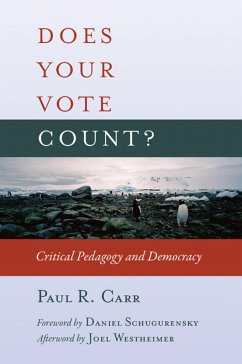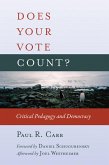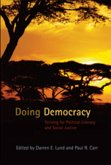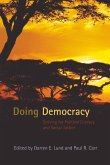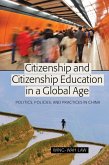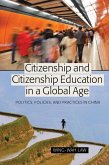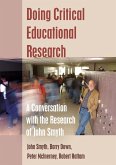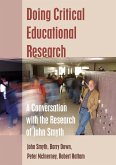The public debate on democracy is often constrained within an alienating and disenfranchising narrative of opinion polls, campaign platforms, personalities and formal structures that generate legislation, all of which surreptitiously seems to trickle down to the classroom. Paul R. Carr asserts that democracy must be cultivated in a vigorous, conscientious, meaningful and critical way in and through education in order for it to have salience in society, especially within a neoliberal conjuncture that promotes limited space for epistemological interrogation of how we understand and are engaged in maintaining and/or transforming our societies. Building on the critical pedagogical work of Paulo Freire, Joe L. Kincheloe, and others, this book develops a framework for understanding how a thicker democratic education can be conceptualized and implemented in schools. The book aims to move the focus on democracy away from voting, and place it more properly on the importance of social justice and political literacy as a way of understanding what democracy is and, importantly, how to make it more relevant for all of society. The book concludes that another democracy is possible, as well as being desirable, and that education is the fundamental intersection in which it must be developed.
«Paul R. Carr has produced a rich and impressive examination of the multiplicity of relationships among notions of democratic formation, critical pedagogy, human rights, anti-racism, and feminist, anti-colonial, political and cultural studies. Drawing from a deep well of intriguing and eclectic sources..., he moves with clarity and élan between the broad and the narrow, the general and the specific to capture the power of theory without sacrificing the nitty-gritty of concrete practice. A balance of possibilities rather than false dualisms will be found here. 'Does Your Vote Count? 'has become an essential contribution to my own work and teaching.» (Tom Wilson, Chapman University)
«In 'Does Your Vote Count?' Paul R. Carr extends the critical analysis and contextualization of Democracy while carefully trying not to fall in the trap of offering new final understandings and solutions for what democracy and democratic processes should be. I read Carr's book as an invitation to approach democracy (re-written with a small d) through critical pedagogical perspectives, opening democracy's meaning to multiple understandings, and diverse human experiences. We should all try to join in this dialogue which Carr, joining other great critical voices of the past (Freire, Kincheloe), considers to be one guided by humility.» (Zvi Bekerman, Hebrew University)
«In this compendium of writings, Paul R. Carr...calls for a rethinking of bourgeois democratic politics. What are the contours surrounding this conception of democracy and what are its limitations? What alternative conceptions of democracy ought to be brought to fruition if we are to overcome the onslaught of the 'neo-liberal', neo-fascist and White-Anthropocentric policies we have been witnessing, and under which the majority world and eco-system have been suffering? What effective responses can a socially engaging critical pedagogy afford us in this regard? This book covers a lot of ground and should inspire all those who dream of and work for a better world.» (Peter Mayo, University of Malta)
«This book should be of great interest to teachers, scholars and researchers interested in critical pedagogy. The book opens up the whole question of criticality, and of what kinds of criticality are acceptable in educational settings. It directly speaks to examining issues in education from a plurality of academic viewpoints and perspectives including the broader policy issues, i.e., minority studies, democracy, and issues of educational equality and equity. Without a doubt, it will have both a scholarly and intellectual impact on the field. Paulo Freire's approach to critical pedagogy is well served here, as is the legacy of the late Joe L. Kincheloe, whose many contributions and influence are evident throughout this book.» (Sheila Macrine, New Jersey City University)
«Paul R. Carr has written an innovative and timely book on the current state of democracy, which, he argues, can no longer be understood within mainstream, hegemonic, electoral-based thinking. His meshing of democracy with critical pedagogy is a welcome addition to the literature and the field. He meticulously documents how neo-liberal democracy has wrought many anti-democratic measures, events and inequities. More importantly, Carr demonstrates how education, from a critical pedagogical vantage point, can bring hope to those who have been discarded by Westernized democratic electoral systems that refuse to respond to the needs of the people....This book breaks fresh ground in arguing that educators (and citizens) can fashion a new, more resilient and more meaningful democracy. This book moves the debate away from how and who gets elected to the essence of power and engagement within society. Democracy is more than
«In 'Does Your Vote Count?' Paul R. Carr extends the critical analysis and contextualization of Democracy while carefully trying not to fall in the trap of offering new final understandings and solutions for what democracy and democratic processes should be. I read Carr's book as an invitation to approach democracy (re-written with a small d) through critical pedagogical perspectives, opening democracy's meaning to multiple understandings, and diverse human experiences. We should all try to join in this dialogue which Carr, joining other great critical voices of the past (Freire, Kincheloe), considers to be one guided by humility.» (Zvi Bekerman, Hebrew University)
«In this compendium of writings, Paul R. Carr...calls for a rethinking of bourgeois democratic politics. What are the contours surrounding this conception of democracy and what are its limitations? What alternative conceptions of democracy ought to be brought to fruition if we are to overcome the onslaught of the 'neo-liberal', neo-fascist and White-Anthropocentric policies we have been witnessing, and under which the majority world and eco-system have been suffering? What effective responses can a socially engaging critical pedagogy afford us in this regard? This book covers a lot of ground and should inspire all those who dream of and work for a better world.» (Peter Mayo, University of Malta)
«This book should be of great interest to teachers, scholars and researchers interested in critical pedagogy. The book opens up the whole question of criticality, and of what kinds of criticality are acceptable in educational settings. It directly speaks to examining issues in education from a plurality of academic viewpoints and perspectives including the broader policy issues, i.e., minority studies, democracy, and issues of educational equality and equity. Without a doubt, it will have both a scholarly and intellectual impact on the field. Paulo Freire's approach to critical pedagogy is well served here, as is the legacy of the late Joe L. Kincheloe, whose many contributions and influence are evident throughout this book.» (Sheila Macrine, New Jersey City University)
«Paul R. Carr has written an innovative and timely book on the current state of democracy, which, he argues, can no longer be understood within mainstream, hegemonic, electoral-based thinking. His meshing of democracy with critical pedagogy is a welcome addition to the literature and the field. He meticulously documents how neo-liberal democracy has wrought many anti-democratic measures, events and inequities. More importantly, Carr demonstrates how education, from a critical pedagogical vantage point, can bring hope to those who have been discarded by Westernized democratic electoral systems that refuse to respond to the needs of the people....This book breaks fresh ground in arguing that educators (and citizens) can fashion a new, more resilient and more meaningful democracy. This book moves the debate away from how and who gets elected to the essence of power and engagement within society. Democracy is more than

